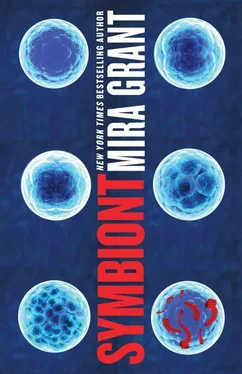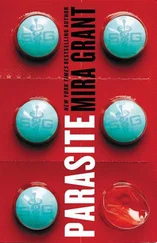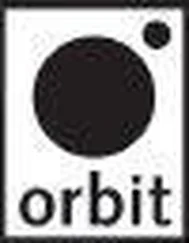Nathan grinned. “Disabling the mechanism that ‘greets all visitors to our candy wonderland’ would mean dismantling half the air-conditioning system, and we don’t have the time or the manpower to waste on something like that. Fishy says that the scent will run out eventually, and in the meantime, anyone who has a chemical sensitivity should use the other door or cover their nose when they walk through here.”
I sneezed again before sniffling and saying, “That’s really thoughtful of him.”
“He’s a thoughtful guy,” said Nathan, starting for the nearest escalator—which was running, I noted. No matter how many buildings around here might go dark, this one had power to spare. The rail was shaped like a never-ending rope of licorice, which was a nice, if surreal, touch.
Once we were both standing on the moving walkway, Nathan sobered and said, “Fishy’s been working with Mom for a while, but he wasn’t able to convince his wife not to get an implant. Mom says he experienced a profound disassociation from reality when she started trying to eat him—the wife, not Mom—and I think she’s probably right.”
“Dr. Cale, not the wife,” I guessed.
Nathan nodded. “Yeah. Fishy thinks of the rest of us as… well, characters in a uniquely immersive video game environment. That’s how he’s coping at this point, and as long as he isn’t trying to shoot people for extra points, we don’t press too hard. He’ll come around to reality when he feels like he’s ready.”
“Assuming reality is any better,” I said softly.
“Yeah.” Nathan sighed. “There is that.”
We both quieted then, and I looked curiously around as the escalator carried us through the open-air lobby—where people in lab coats and sweaters were gathered in small groups, some clutching coffee cups like their lives depended on it, others gesturing wildly with empty hands as they tried to get some vital point of science across. I recognized some of them from Dr. Cale’s lab. Others were new. Members of both groups turned to watch as the escalator carried us onward, toward the second floor.
I shrunk back against Nathan, who put an arm around my shoulder and said, “We’ve gained some people. Mom needed the labor, and they needed a safe place.”
“Right,” I said weakly, and tried to focus on the faux Candyland furnishings and bright, juvenile murals on the walls. I’d never been here before, in either of my incarnations. Sally’s family had been too middle class and respectable to have taken her there as a child. All the family photo albums were focused on Disneyland and Hawaii and other places that were probably a lot of fun for her, even if she looked sullen and annoyed in more than half the pictures. Sally would probably have rolled her eyes at Captain Candy’s Chocolate Factory. I was amazed. The thought that a place like this could exist had never crossed my mind.
It had probably looked a little different before the disaster. Someone had nailed plywood sheets across the lowest of the lobby windows, and all the lobby doors, and only the fact that those sheets were painted in candy colors kept them from being glaringly out of place. The chandelier—a dizzying confection of giant peppermints and gumdrops—was draped in surveillance equipment and wireless boosters, keeping the entire building connected to whatever was left of the Internet.
The lobby passed out of view as the escalator finally reached the second floor, passing through another cheerfully painted tunnel before terminating at a landing covered in carpet so wildly patterned in swoops and swirls that it made my stomach churn if I looked at it for too long. There was also an elevator, which Nathan walked toward and pressed the call button. Going down. I blinked at him.
“Captain Candy’s Chocolate Factory is a weird sort of hybrid building,” he explained, motioning for me to join him. “It was designed half as a working confectionary company, and half as a theme park that kept the rest afloat by selling tour packages and ‘birthday party extravaganzas.’ There’s a whole floor upstairs dedicated to the party rooms. They’re pretty ridiculous, and they make the rest of the place look like it has a subdued color scheme.”
I blinked again. “I’m having trouble picturing that,” I admitted.
“I’ll take you for a tour later on,” he said. “Anyway, the place is pretty clever in its use of space. There was a false factory set up for tours, so that people could see candy being made the way it is in the movies—one piece at a time, being hand-wrapped and put into whimsical boxes—and then there was the real factory floor, underneath the rest of the building. That’s where Mom set up her lab. She said it would help her get back to her roots. Also, it’s the only place aside from the cookie garden in the upstairs party rooms that’s fully ADA compliant, and she wanted to be able to get around her own lab.”
“That makes sense.” The elevator arrived, and we stepped inside. I was obscurely relieved to see that it didn’t have glass walls. Our descent into children’s literature was not yet complete.
The elevator counted off the floors: first the lobby we had passed through on our way to the elevator bay—not a very efficient building design—and then two lower floors before it binged reassuringly and opened its doors, revealing the latest incarnation of Dr. Cale’s lab. It was, as always, an oasis of chaos masquerading as calm. The various people who rushed back and forth with quick, meaningful steps all wore lab coats over scruffy jeans and T-shirts. A few of them glanced in our direction, nodding at Nathan before they continued on their way, having apparently written me off as a nonentity. I frowned as I stepped out of the elevator.
“Has there been a total staff turnover?”
“No, but most of the people who’ve been working with Mom for a while have moved on to heading their own research groups rather than doing grunt work,” said Nathan, following me out of the elevator. The doors slid shut behind him. “It’s amazing how many leads we have to follow, and how few of them are leading us anywhere. You’ll see more familiar faces when it gets a little later in the day. There’s not much motivation to keep really normal hours.”
“Right.” I took Nathan’s hand, half automatically, and looked around. This had been the working factory level of the building: as such, industrial gray and sterile hospital white still had a place here, rather than being painted over with a hundred shades of candy swirl. The floor was uncarpeted tile, and posters covered the walls. I couldn’t read most of them, thanks to my dyslexia, but I knew enough to recognize the D. symbogenesis parasite. It was pictured at various stages of its life cycle, which made me feel vaguely uncomfortable, like I was seeing my own naked baby pictures held up for the perusal of strangers.
Other posters blazed safety warnings in large red letters that swam in and out of focus when I squinted at them, accompanied by handy pictograms showing the right way to deal with a chemical spill or put out a lab fire. Still others were printed in blocks of dense text that blurred like fingerprints when I tried to make sense of them. I held tighter to Nathan’s hand, aware of how out of place I felt, and even more aware that this place should have grown up around me. I should have been here from the beginning, influencing the shape of the rooms, helping them hang those posters. I felt like I had missed out on something essential, a chance to finally be at the core of my own story, and I wasn’t sure that was the kind of chance that would ever come around again.
We were halfway across the room when a narrow face topped by a roughly cut shock of disarrayed brown hair poked out from behind a filing cabinet, moving so slowly that it seemed like an attempt not to startle me. I stopped walking. Nathan did the same. I met the face’s eyes, matching their anxious look with an equally anxious expression of my own. The face’s owner inched hesitantly into view: a lanky, underfed young man in a lab coat, T-shirt, and jeans, but without shoes on, which made him seem faintly out of place even though he’d been living in labs like this one for as long as he’d been alive. Like me, he was a stranger even in the space that should have been his own.
Читать дальше












